
Chemical modifications of RNA are critical for RNA metabolism, function, and localization. One of the most abundant internal RNA modifications is N6-methyladenosine (m6A). It has been previously reported that viral RNA contains internal m6A modifications. However, only recently the function of m6A began to be unraveled during virus infections of HIV, hepatitis C virus and Zika virus.
In the present study, the research groups led by Prof. GUAN Wuxiang and Prof. DENG Fei in Wuhan Institute of Virology of the Chinese Academy of Sciences demonstrated that EV71 RNA contains m6A modification and investigated its function during EV71 C4 subtype infection.
The scientists found that the expression and localization of m6A methyltransferases, demethylases, and binding proteins were affected upon virus infection. Moreover, perturbation of the expression of m6A-related proteins or mutation of the m6A modification sites altered viral replication, suggesting that the host m6A machinery is involved in viral replication.
Notably, they showed that the m6A methyltransferase METTL3 not only interacted with viral RNA-dependent RNA polymerase (RdRp) 3D, but also induced sumoylation and ubiquitination of the polymerase, which have been reported to facilitate its stability and boost viral replication.
Collectively, they present evidence supporting the importance of m6A modification for the replication of EV71. The expression and localization of the m6A methylation machinery were affected by EV71 virus infection. The expression of proteins in the m6A methylation machinery in turn regulated viral replication. Mutation of the m6A sites decreased viral replication.
Nevertheless, further studies are necessary to elucidate the detailed mechanisms, such as how the methyltransferases, demethylases and YTH proteins alter their localization and whether viral non-structural proteins play a role in the methylation process. In addition, their study suggests m6A modification may be a novel target for antivirals of EV71.
The Results have been published in Nucleic Acids Research entitled "N6-methyladenosine modification and METTL3 modulate enterovirus 71 replication".
The study was supported by the Ministry of Science and Technology of China and Chinese Academy of Sciences.

M6A modification represents an important component in the regulation of EV71 replication. (Image by GUAN Wuxiang)

86-10-68597521 (day)
86-10-68597289 (night)

52 Sanlihe Rd., Xicheng District,
Beijing, China (100864)

